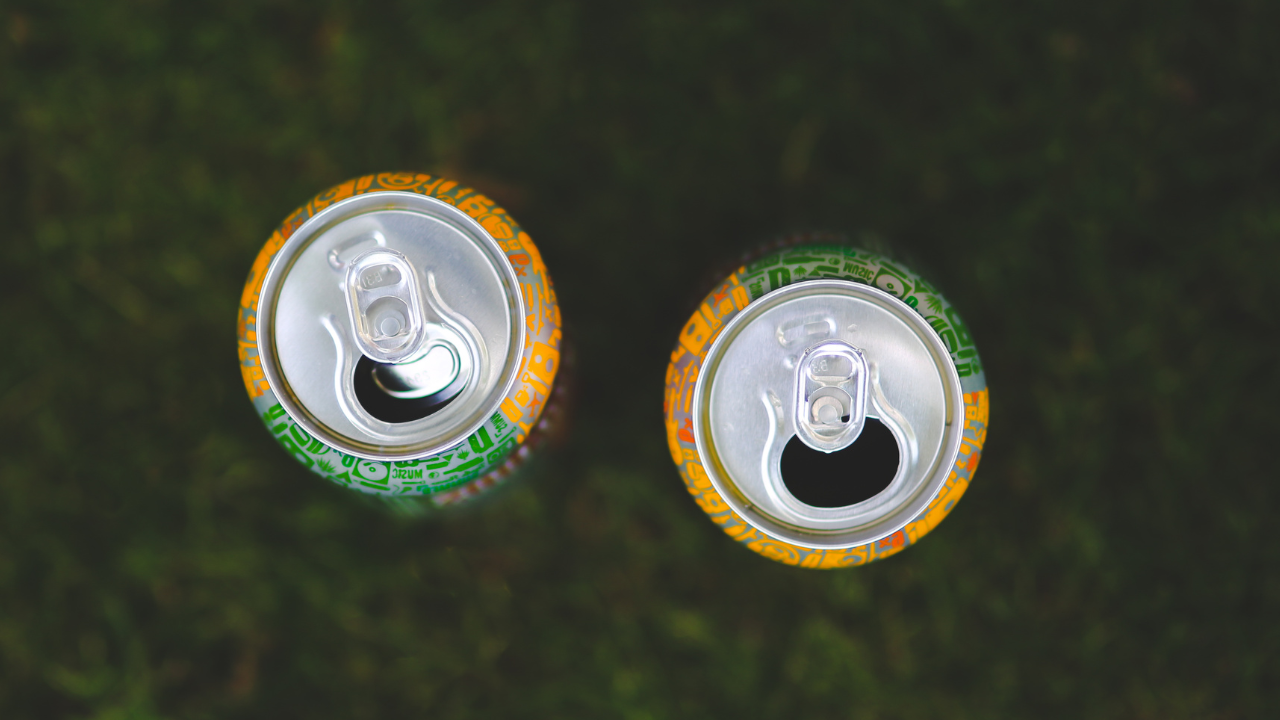Aspartame and Cancer - A Dietitian’s Perspective
The World Health Organization (WHO) recently announced in July 2023 that aspartame, which can be found in the beloved yet controversial Diet Coke, has been classified as possibly carcinogenic. The recent decision came from WHO’s International Agency for Research on Cancer (IARC), who classified aspartame as possibly carcinogenic to humans (IARC Group 2B) on the basis of limited evidence for cancer in humans.
If you’re new here, hello and welcome! My name is Hannah and I am a non-diet dietitian here to help you improve your relationship with your food and finally find food freedom. As a non-diet dietitian, I frequently get asked how sweeteners fit into an intuitive eating lifestyle.
Non-nutritive sweeteners like aspartame have been heavily debated for decades, despite aspartame being one of the most exhaustively studied ingredients in the human food supply. So what’s the deal? Should you abandon your diet sodas and other sugar-free products? Or is aspartame actually safe to consume?
Table of contents
What is aspartame?
How does aspartame compare to other artificial sweeteners?
Is aspartame safe?
Does aspartame cause cancer?
Does aspartame cause weight gain?
Are there any possible side effects of consuming aspartame?
Are dietitians paid to promote aspartame?
What is aspartame?
Aspartame is a non-nutritive sweetener (otherwise referred to as an artificial sweetener) that is commonly found in sugar-free products such as diet sodas, nutrition bars, chewing gum, and desserts such as sugar-free puddings and light ice creams. Aspartame is also sold in the US as the tabletop sweetener Equal®. Aspartame is not heat stable and loses its sweetness when heated, so it typically isn’t used in baked goods.
Non-nutritive sweeteners such as aspartame provide very few to no calories and they generally do not raise blood sugar levels. Because aspartame is about 200 times sweeter than table sugar, aspartame is typically used in relatively small amounts.
How does aspartame compare to other artificial sweeteners?
Aspartame is among a variety of other non-nutritive sweeteners that are authorized as food additives in the U.S. These sweeteners include:
Sucralose (sold under brand name Splenda®)
Acesulfame potassium (referred to as Ace-K)
Neotame
Advantame
Saccharin (sold under brand name Sweet and Low®)
There are also fruit- and plant-based sweeteners on the market, including:
Stevia
Monk fruit
Thaumatin
These sweeteners differ in terms of their chemical compositions and sweetness levels. Some people report taste differences amongst the sweeteners. If you choose to consume non-nutritive sweeteners, you can ultimately choose the ones that you prefer. Different pre-packaged foods will utilize different sweeteners and you can find the types listed in the ingredients on the food label.
Read more: The Ultimate Guide to Artificial Sweeteners
Is aspartame safe?
The short answer is yes, aspartame is safe to consume. Aspartame is one of the most studied food additives in the human food supply, with more than 100 studies supporting its safety.
The US Food and Drug Administration (FDA) regulates non-nutritive sweeteners. The FDA first approved the use of aspartame as a sweetener in 1974 and it was approved as a general-purpose sweetener in 1996. Since then, the FDA has continued monitoring the scientific literature for new information on aspartame. The Joint FAO/WHO Expert Committee on Food Additives (JECFA) conducts scientific risk assessments and safety evaluations of food additives and have concluded that aspartame is safe for its intended uses.
The FDA has established acceptable daily intakes (ADIs) for aspartame, which estimate the the amount of a substance considered safe to consume each day over the course of a person’s lifetime. The ADI for aspartame is 50 milligrams per kilogram of body weight (mg/kg) per day. This is a conservative number that the vast majority of people will not reach.
To further illustrate the safety, it is estimated that a person weighing 150 pounds (68 kg) would exceed the ADI (3,400 mg of aspartame) if consuming more than an average of 19 cans of diet soda or more than 85 individual packets of aspartame every day over the course of their lifetime. I don’t know about you, but I have never gotten anywhere near that number, even with my beloved Diet Coke.
Does aspartame cause cancer?
IARC classified aspartame as possibly carcinogenic to humans (Group 2B) on the basis of limited evidence for cancer in humans. But what exactly does this mean?
IARC sorts carcinogens and potential carcinogens into four different categories:
Group 1: Carcinogenic to humans
Group 2A: Probably carcinogenic to humans
Group 2B: Possibly carcinogenic to humans
Group 3: Not classifiable as to its carcinogenicity in humans
The agency has placed aspartame in the low-risk Group 2B, meaning evidence for its cancer-causing properties remains limited. The strength-of-evidence classification in Group 2B is generally used either when there is limited, but not convincing, evidence for cancer in humans or convincing evidence for cancer in experimental animals, but not both. In other words, there is not strong evidence to support that aspartame is carcinogenic unless you are a lab rat.
Other Group 2B carcinogens include aloe vera, Asian pickled vegetables, and radiofrequency magnetic fields from your cell phone. The WHO guidelines do not quantify the risk of any Group 2B substances, nor do they recommend limits for your exposure. Instead, the category simply indicates how strong the evidence is that they have some carcinogenic effects.
This is where the Joint Expert Committee on Food Additives (JECFA) comes in. JEFCA concluded that the data evaluated indicated no sufficient reason to change the previously established ADI of aspartame. Which, as you may recall, is quite high and not reached by the majority of people.
The link between aspartame intake and cancer is a tenuous one. My take is that you can continue to drink your diet soda with your plate of pickled vegetables while slathering on aloe vera and texting on your iPhone without worrying too much about increasing your risk for cancer.
Does aspartame cause weight gain?
Although recently in the news for being “possibly carcinogenic”, aspartame has historically been debated for its alleged role in weight gain. At the same time, alternate sources will state that artificially sweetened foods and beverages are a useful tool for those pursuing intentional weight loss. So, which is it?
Non-nutritive sweeteners provide very few to no calories. For this reason, they are sometimes recommended as an alternative for those looking to decrease their caloric intake. They also do not individually impact blood sugar levels like regular sugar does, so they are frequently recommended as an option for those looking to manage their blood sugars, such as those with diabetes.
Others hypothesize that people may compensate for “calorie-free” or low-calorie choices by eating or drinking more calories in other food choices or future meals. These additional calories may lead to weight gain or prevent weight loss. This instance may happen in some cases, but there is little evidence from scientific studies that people consistently and consciously overconsume calories as a result of consuming non-nutritive sweeteners.
The main point is that our body weight is the outcome of many factors beyond the food choice we make. Not to mention that intentional weight loss through dieting tends to do more harm to our health than good.
As a non-diet dietitian, I encourage people to ask themselves what the “why” is behind their food choices. For example, why are you choosing Diet Coke? Are you choosing Diet Coke over regular Coke because you would feel guilty for drinking your calories? Would you feel anxious if a regular soda was the only option available? Would you restrict after having a regular soda or feel like you had to “burn it off”? Taking a look at your motivation for making certain food and beverage choices can give you an insight into your relationship with food, which is ultimately an important factor in your overall health.
In the world of disordered eating and eating disorders, non-nutritive sweeteners tend to be abused because of their low calorie profile. As mentioned, it is generally safe to consume non-nutritive sweeteners such as aspartame, but issues may arise when the choice to consume them is rooted in disordered reasons.
Are there any possible side effects of consuming aspartame?
For the general population, consuming aspartame will not cause any side effects. That said, there are anecdotal reports of aspartame consumption causing symptoms, namely headaches.
It is important to remember that aspartame is broken down as aspartic acid, phenylalanine and methanol, all of which are naturally present in other foods and beverages and in much higher quantities. This makes a biological mechanism for aspartame-specific symptoms and/or sensitivities difficult to hypothesize.
If you do find that aspartame causes headaches or other symptoms, you have the power to choose foods without aspartame as an ingredient. This does not mean, however, that you have the right to tell others if they should or shouldn’t consume it. To each their own!
People with difficulty metabolizing phenylalanine (an amino acid in aspartame) because of a rare genetic disorder called phenylketonuria (PKU) should avoid or restrict aspartame. Newborns are routinely tested for PKU before leaving the hospital. Consumers can identify whether a product has aspartame by looking for it by name in the ingredient list on the product label, which must include a statement to inform people with PKU that the product contains phenylalanine.
Are dietitians paid to promote aspartame?
At the time that I am writing this, there is a recent publishing in The Washington Post stating that dietitians are paid by the food industry to shape the public’s eating habits.
The post came out shortly after the WHO announcement regarding aspartame. In response to the updated aspartame classification, the American Beverage Association partnered with several dietitians to share messages with their audiences about the safety of aspartame. And oh boy, did this get people fired up.
The Washington Post article essentially stated that dietitian influencers who work with brands are “sell outs” and that their credibility is at large due to the fact that some posts are part of paid partnerships. There were also claims that these dietitians did not follow the Federal Trade Commission (FTC) guidelines for creating sponsored content.
To be clear, this blog post is not sponsored by The American Beverage Association or any other company and all thoughts are my own. I did not participate in the campaign and I was not included in the Washington Post article, but I consider myself a peer to many who were.
While I agree that transparency and consistency within the FTC guidelines are important, I do find it frustrating that registered dietitians regularly receive so much pushback when there are unqualified “influencers” and “coaches” who build their businesses on misinformation and food fear mongering.
There are unqualified influencers and celebrities sharing their recommendations for products every day, including for foods, supplements, and other health and wellness products that they have no business making recommendations for. And the masses take their recommendations (including paid ones) seriously. Look at Gwyneth Paltrow’s brand Goop, for example. Or the Kardashians promoting Sugar Bear supplements. Or Jennifer Lopez recommending Goli apple cider vinegar gummies. Or Oprah as the spokesperson for Weight Watchers. I could go on and on.
When I’m looking for recommendations for a a skincare product, I am going to seek out the advice of a qualified professional in that field. When you are looking for health and wellness product recommendations, my hope is that you would trust a registered dietitian, a person with credibility and expertise.
When a dietitian works with a brand, we are not given a script and told exactly what to say about the product. Instead, we offer our expertise to the brand, sometimes for a paycheck. The brand pays us to use our knowledge to promote their product to our audiences, who are frequently turning to us for these recommendations.
I can’t speak for other dietitians, but I receive emails every single day from brands that I would never work with in a million years because they don’t support my values, I don’t use the product myself, or the product is just straight up diet culture BS. Dietitians like myself are not just working with anyone and everyone who pops up in our email inbox. And just because we work with brands does not mean that we don’t have any critical thought or the ability to make informed and educated decisions.
Registered dietitians are qualified nutrition experts and we abide by a code of ethics. We are at risk of losing our licensure if we participate in unethical practices. The same cannot be said for most of the “influencers”. They don’t really have anything to lose.
I again cannot speak for all dietitians and there are plenty whose practices I disagree with, but as a dietitian myself, I am trying to do my best to spread an inclusive non-diet message to help people heal their relationship with food. This will go against much of the nutrition and health messaging that you will hear in the media. I mean, telling people that it’s okay to enjoy all foods is not quite as grabby as “avoid these toxic foods that are filled with chemicals and will give you cancer!”
At the end of the day, you get to choose what foods you do or don’t consume. I empathize with those who feel frustrated and confused by all of the mixed messaging regarding food and health. Diet culture has really done a number on us all.
Bottom line - does aspartame cause cancer?
There are not any individual foods or ingredients that cause cancer, aspartame included. The recent IARC classification of “possibly carcinogenic” is based on limited evidence in humans. Unless you are consuming dozens of cans of Diet Coke each day, you likely don’t have to be too worried about aspartame.
Learn more
Related podcast episode
Want more help on your diet ditching journey?
Join my signature membership to become part of a community of ex-dieters working towards food freedom and making peace with food so they no longer need to cut out their favorite foods.

































